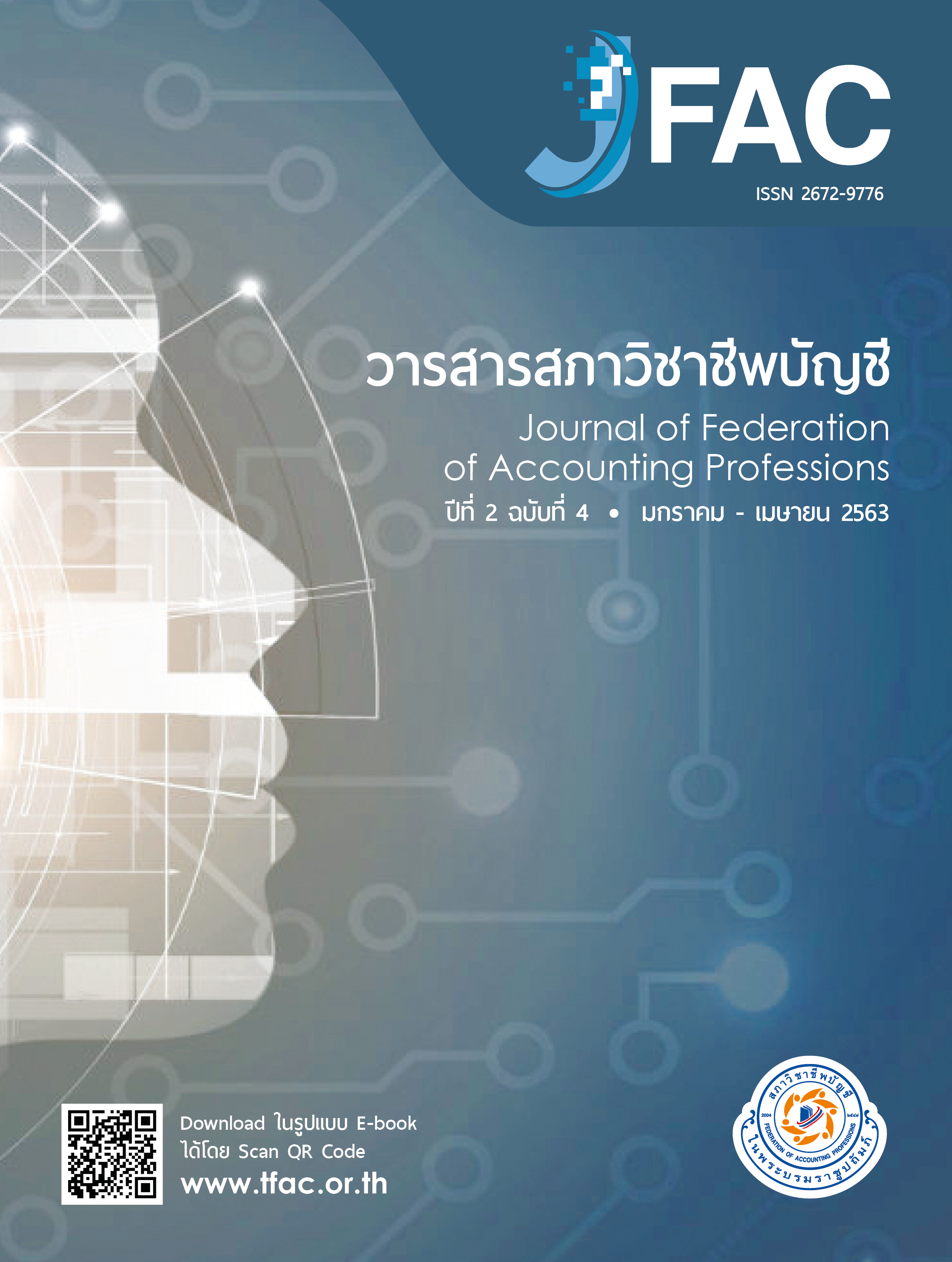ผลกระทบของความสามารถในการปรับตัวต่อการตัดสินใจทางการบัญชีและผลการปฏิบัติงานด้านบัญชี: หลักฐานเชิงประจักษ์จากนักบัญชีในจังหวัดระยอง
Main Article Content
บทคัดย่อ
การวิจัยนี้มีวัตถุประสงค์เพื่อทดสอบผลกระทบของความสามารถในการปรับตัวต่อการตัดสินใจทางการบัญชีและผลการปฏิบัติงานด้านบัญชี ในการวิจัยนี้เก็บข้อมูลโดยใช้แบบสอบถามจากผู้ทำบัญชีในจังหวัดระยอง จำนวน 201 คน สถิติที่ใช้ในการวิเคราะห์ข้อมูล ได้แก่ การวิเคราะห์ความถดถอยเชิงพหุคูณ ผลลัพธ์ของการวิจัย พบว่า ความสามารถในการปรับตัวทั้ง 3 ด้าน (ได้แก่ ความสามารถในการแก้ปัญหา ความสามารถในการทดสอบความเป็นจริง และความยืดยุ่น) มีผลกระทบเชิงบวกต่อการตัดสินใจทางการบัญชีและผลการปฏิบัติงานด้านบัญชี และการตัดสินใจทางการบัญชีมีผลกระทบเชิงบวกต่อผลการปฏิบัติงานด้านบัญชี นอกจากนี้ ผลสรุปของการวิจัย ข้อเสนอแนะ และแนวทางการวิจัยในอนาคตได้ถูกนำเสนอไว้อย่างชัดเจน
Article Details
เนื้อหาและข้อมูลในบทความที่ลงตีพิมพ์ในวารสารสภาวิชาชีพบัญชี ถือเป็นข้อคิดเห็นและความรับผิดชอบของผู้เขียนบทความโดยตรงซึ่งกองบรรณาธิการวารสารไม่จำเป็นต้องเห็นด้วยหรือร่วมรับผิดชอบใด ๆ
บทความ ข้อมูล เนื้อหา รูปภาพ ฯลฯ ที่ได้รับการตีพิมพ์ในวารสารสภาวิชาชีพบัญชี ถือเป็นลิขสิทธิ์ของวารสารสภาวิชาชีพบัญชี หากบุคคลหรือหน่วยงานใดต้องการนำข้อมูลทั้งหมดหรือบางส่วนไปเผยแพร่ต่อหรือเพื่อกระทำการใดๆ จะต้องได้รับอนุญาตเป็นลายลักษณ์อักษรจากวารสารสภาวิชาชีพบัญชี ก่อนเท่านั้น
เอกสารอ้างอิง
Akça, Y., Özer, G. & Kalaycıoğlu, E. (2018). Impact of Career Adaptability on Employee Performance, International Journal of Business and Management Invention, 7(11), 24-28.
Akenbor, C. O. & Onuoha, T. E. (2013). Ethical Concept and Professional Judgment in Corporate Financial Reporting: Empirical Evidence from Nigeria, International Journal of Business and Economic Development, 1(3), 46-59.
Apostolou, B., Watson, S.F., Hassell, J.M. & Webber, S.A. (2001). Accounting Education Literature Review (1997-1999). Journal of Accounting Education, 19(1), 1-61.
Armstrong, J.S. & Overton T.S. (1977). Estimating Non-Response Bias in Mail Surveys. Journal of Marketing Research, 14(3), 396-402.
Bar-On, R. (2004). Bar-On Emotional Quotient Inventory: A Measure of Emotional Intelligence. MultiHealth Systems, Toronto.
. (2006). EQ-i Leadership User’s Guide. Toronto, Canada: Multi-Health Systems.
Bharwaney, G., Bar-On, R., & MacKinlay, A. (2007). EQ and the Bottom Line: Emotional Intelligence Increases Individual Occupational Performance, Leadership and Organizational Productivity. Bedfordshire, UK: Ei World Ltd.
Bharwaney-Orme, G., & Bar-On, R. (2002). The Contribution of Emotional Intelligence to Individual and Organizational Effectiveness. Competency & Emotional Intelligence, 9 (4), 23-8.
Blay, A., Sneathen, L. Jr. & Kizirian, T. (2007). The Effects of Fraud and Going Concern Risk on Auditors' Assessments of The Risk of Material Misstatement and Resulting Audit Procedures. International Journal of Auditing, 11(3), 149-163.
Di Fabio, A., Palazzeschi, L., & Bar-On, R. (2012). The Role of Personality Traits, Core Self-Evaluation, and Emotional Intelligence in Career Decision-Making Difficulties. Journal of Employment Counseling, 49(3), 118–129.
Durgut, M., Gerekan, B. & Pehlivan, A. (2013). The Impact of Emotional Intelligence on the Achievement of Accounting Subject. International Journal of Business and Social Science, 4(13), 64-71.
Gatewongsa, K. & Ussahawanitchakit, P. (2013). Internal Control Strategy of Beverage Businesses in Thailand: Effects on Goal Achievement. International Journal of Business Strategy, 13(3), 53-74.
Hair, J. F., Black, W.C., Babin, B.J., & Anderson, R.E. (2010). Multivariate Data Analysis (7thed.). USA: PEARSON Prentice Hall.
Hammersley, J. S. (2011) A Review and Model of Auditor Judgments in Fraud related Planning Tasks, Auditing: A Journal of Practice & Theory, 30(4), 101–28.
Kokemuller, Neil. (n.d.). How to Demonstrate Adaptability on the Job. Work - Chron.com. Retrieved from http://work.chron.com/demonstrate-adaptability-job-15407.html
Krejcie, R. V. & Morgan, D. W. (1970). Determining Sample Size for Research Activities. Psycholological Measurement, 30(3), 607-610.
Mock, T. & Turner, J. (2005). Auditor Identification of Fraud Risk Factors and Their Impact on Audit Programs. The International Journal of Auditing, 9, 59-77.
Perks, J., & Bar-On, R. (2010). Coaching for Emotionally Intelligent Leadership. In J. Passmore (Ed.), Coaching for leadership. London, UK: Kogan Page, 55-74.
Solomon, J. & Trotman, K. T. (2003). Experimental Judgment and Decision Research in Auditing: The First 25 Years of AOS, Accounting, Organizations and Society, 28(4), 395-412.
Sony, M. & Mekoth, N. (2016). The Relationship Between Emotional Intelligence, Frontline Employee Adaptability, Job Satisfaction and Job Performance. Journal of Retailing and Consumer Services, 30, 20-32.
Stuebs, Jr., M.T. & Thomas, W.C. (2009). Improved Judgment in Financial Accounting: A Principled Approach, CPA Journal, 79(1), 32-35.
Thapayom, A., Ussahawanitchakit, P., & Boonlua, S. (2018). Effect of Emotional Intelligence Orientation on Audit Sustainability of Certified Public Accountants (CPAs) in Thailand. Journal of Accountancy and Management, 10(3), 1-16.


